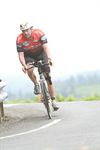Poor Cycling Technique and Myofascial Low Back Pain
This study was inspired by a 24-year-old male chiropractic patient’s report that he was experiencing numbness and tickling in a small region of his upper right buttock. His chiropractor noted that the condition had developed in the few days since the man’s  most recent bimonthly adjustment.
most recent bimonthly adjustment.
A physical exam and close scrutiny of the patient�s history revealed that the complaint was probably gluteus medius syndrome (GMS) resulting from the man�s activities as an amateur cyclist.
Because overuse hip injuries are rare in cycling, the authors found little research documenting such cases. Although this paper reports only a single-case study, it offers detailed and specific findings that may be of genuine value to clinicians whose patients include cyclists and others who engage in repetitive exercise and sports placing special demands on muscles and supporting structures. The case report also reviews the manifestations and treatments options reported in the literature that pertain to myofascial pain.
The subject�s chiropractor learned that the ailing cyclist had just begun riding a new bicycle. Because the new bike had different gearing than his previous bicycle, by continuing to use his customary riding technique, the patient was fatiguing and straining himself, as he hadn’t done before getting the new bike. The patient’s cycling technique was modified to accommodate the changed gearing of the new machine. After only 2 days, the GMS symptoms resolved and did not return-results attributable to altering a cycling technique that was damaging him and interfering with his favorite pastime.
The authors conclude: “Taking more time to elicit pertinent historical data and having a working knowledge of patient activities, including sports equipment, may play a decisive role in alleviating pain of myofascial origin.”
Green B, Johnson C, Maloney A. Effects of Altering Cycling Technique on Gluteus Medius Syndrome. Journal of Manipulative and Physiological Therapeutics, Feb. 1999;22(2), pp108-13. Reprints: Tel: (800) 325-4177, ext 4350; Fax: (314) 432-1380